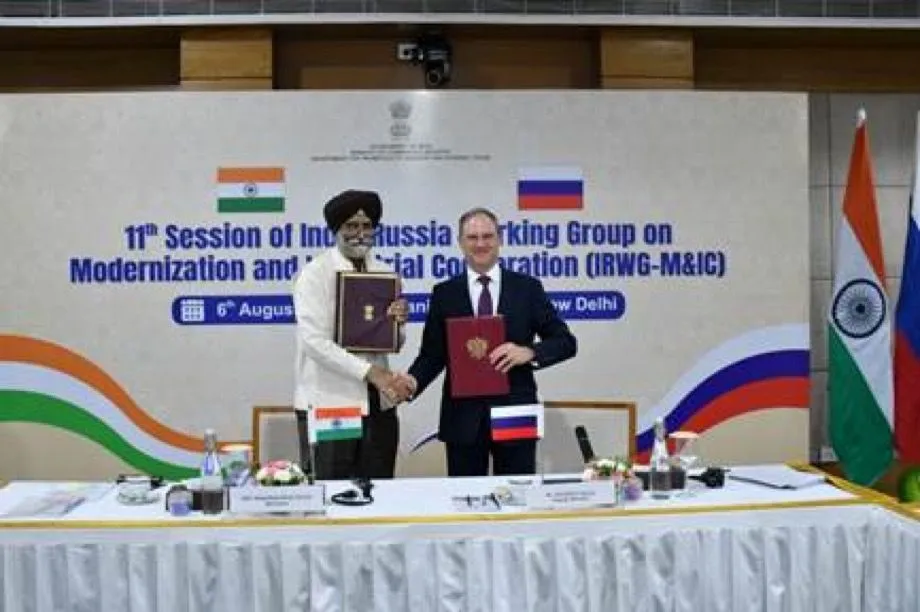India and Russia Reinforce Strategic Ties Through Industrial and Technological Cooperation Amid US Tariff Pressures
- MGMMTeam

- Aug 7, 2025
- 3 min read
India and Russia have taken a decisive step toward deepening their longstanding strategic alliance by signing a comprehensive protocol focused on industrial and technological cooperation. This agreement comes at a crucial juncture, as India faces intensifying trade pressures from the United States over its continued oil imports from Russia. Against this geopolitical backdrop, the latest pact signifies both nations’ resolve to enhance mutual resilience and accelerate collaboration in critical sectors.
The agreement was formalized during the 11th Session of the India–Russia Working Group on Modernisation and Industrial Cooperation, held in New Delhi under the framework of the Intergovernmental Commission on Trade, Economic, Scientific, Technological and Cultural Cooperation. Co-chaired by India’s DPIIT Secretary Amardeep Singh Bhatia and Russia’s Deputy Minister of Industry and Trade, Alexey Gruzdev, the session underscored the shared commitment to push forward in key areas of bilateral growth.

Strategic Sectors in Focus
The new protocol is not just symbolic—it lays the groundwork for substantial cooperation across a range of strategic and emerging sectors. India and Russia have agreed to enhance collaboration in advanced manufacturing technologies, including the development of aerospace infrastructure such as wind tunnel facilities and piston engines for small aircraft. The two sides are also exploring joint innovation in carbon fibre production, additive manufacturing, and 3D printing technologies, which are increasingly crucial in sectors ranging from defence to industrial design.
Another significant area of cooperation involves the exploration and extraction of rare earth elements and critical minerals—resources that are essential for modern electronics, defence technologies, and green energy solutions. With China currently dominating the global rare earth supply chain, the India–Russia partnership in this domain could reshape the geopolitical dynamics of resource control. Furthermore, underground coal gasification, industrial infrastructure development, and modernisation of transport systems such as railways are also included under the broad spectrum of the agreement.
The Tariff Challenge and India’s Strategic Defiance
The timing of this agreement holds particular importance as India grapples with new tariff measures imposed by the United States. Former President Donald Trump, now a leading political figure again, announced a dramatic 25% tariff hike on Indian goods, citing India’s ongoing energy dealings with Russia as justification. This move escalates existing trade tensions and has drawn strong criticism from the Indian government, which has called the measures “unfair, unjust, and unilateral.”
Despite these pressures, New Delhi has made it clear that its strategic autonomy and energy security are non-negotiable. The government has reaffirmed its right to pursue independent trade and energy relations, particularly with traditional allies like Russia. In this context, the protocol signed with Moscow sends a clear message—that India will not yield to coercive economic tactics and will instead seek to diversify its partnerships and reduce dependency on volatile trade relationships.
Expanding the Defence and Technology Horizon
Beyond the industrial realm, the India–Russia relationship continues to flourish in defence and high-end technology domains. In March 2025, India signed a $248 million agreement with Russia for the supply of 1,000 HP engines for T-72 tanks, which includes the transfer of technology for local manufacturing through Armoured Vehicles Nigam Ltd. This not only strengthens India's military self-reliance but also bolsters Make-in-India efforts.
Russia has also extended an offer to India to jointly develop and manufacture the advanced Su-57 stealth fighter jet. If accepted, this deal would involve full technology transfer and domestic production, significantly enhancing India’s air power capabilities. Discussions are additionally underway between both governments on collaboration in nuclear energy and cybersecurity, further solidifying the strategic depth of the partnership.
Looking Ahead: Realignment Through Cooperation
The India–Russia industrial protocol marks a strategic realignment that is not merely reactive but forward-looking. It signifies a broadening of the bilateral relationship from traditional defence cooperation to encompass high-technology manufacturing, critical mineral security, and infrastructure development. As India seeks to hedge against economic unpredictability and diversify its global ties, Russia remains a reliable partner with shared long-term interests.
Amid growing protectionist sentiment and shifting alliances on the global stage, India’s alignment with Russia reaffirms its strategic autonomy. It also reflects a conscious effort to create a multipolar world order where nations can cooperate based on mutual respect, shared vision, and technological synergy, rather than coercion or conditional diplomacy.
Conclusion
The signing of the industrial and technological cooperation protocol between India and Russia marks not just a strengthening of bilateral ties but a strategic statement of intent. As the United States seeks to pressure India through punitive tariffs, New Delhi’s proactive pivot toward Moscow signals its unwillingness to compromise on sovereign decisions. This agreement is not only about economic cooperation—it is a testament to enduring trust, mutual resilience, and a shared roadmap for the future. As global politics continue to shift, such strategic partnerships will play a pivotal role in shaping a more balanced and self-reliant world.
(Sources: OpIndia, Financial Express, Mint)




Comments